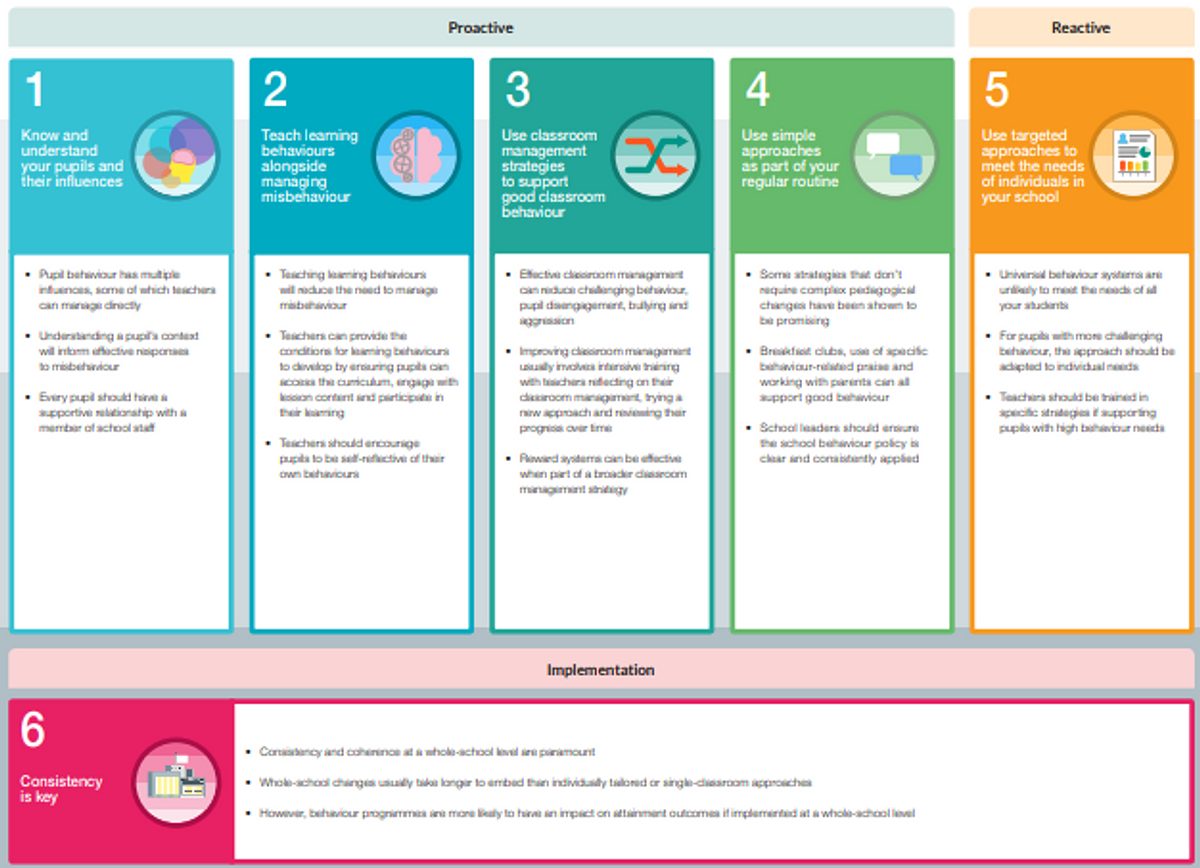A new guidance report published today by the Education Endowment Foundation (EEF) – Improving Behaviour in Schools – finds good evidence that personalised approaches, like daily report cards, can improve disruptive pupils’ behaviour.
The report, which reviews the best available evidence to offer schools six recommendations for improving behaviour, suggests that universal systems are unlikely to work for all students and for those pupils who need more intensive support with their behaviour, a personalised approach is likely to be better.
Today’s report also finds that there is currently a lack of evidence looking at the impact of ‘zero tolerance’ policies. Sometimes described as “no excuses”, these policies aim to create a strict and clear whole-school approach to discipline. Typically, under such policies pupils will automatically receive detentions for a range of misbehaviours such as being late, forgetting homework or using rude language. Other more serious conduct, such as bringing a weapon to school, may result in exclusion – again, without exception.
In the absence of such studies, evidence for how to improve behaviour in schools – summarised in this report – suggests that understanding individual pupils, training teachers in classroom management, and having a consistent approach across the school will support better behaviour.
According to the report, there is little evidence that today’s pupils behave any worse than previous generations. It finds that most pupils in most lessons are well behaved. Even in schools where Ofsted have rated behaviour as inadequate overall, in most classrooms behaviour is rated more highly. But, when problem behaviour does occur, it can have a significant impact on learning outcomes and teacher well-being.
Today’s guidance includes six recommendations for preventing and responding to misbehaviour. Some can be deployed by teachers at classroom level, while others require a school-wide focus. For instance, one recommendation is that schools use simple approaches as part of their regular routine, such as teachers taking the time to greet each pupil personally at the door of the classroom. Evidence suggests this can have a positive impact on pupils’ behaviour in the lesson. Another simple strategy with good evidence behind it is offering free, universal breakfast clubs before school starts, which has been found to prepare pupils well for learning.

Another recommendation focuses on the importance of developing good relationships with pupils, so that teachers know and understand them. The report highlights that pupil behaviour has multiple influences and understanding each pupil’s circumstances can help teachers respond effectively to misbehaviour.
For example, if two children are disruptive in a classroom, one might be looking for attention from the teacher while another wants to escape the classroom as they are bored. If the teacher sends both pupils out of the class, this would reinforce the second pupil’s unhelpful behaviour, but it could stop the first pupil acting up. Similarly, admonishing the pupils in class could reorient the second pupil but would reinforce the first pupil’s misbehaviour. The report includes a technique which, taking teachers no longer than 30 minutes a week, can help them build a positive relationship with those pupils most in need of support.
The other four recommendations focus on:
- Teaching learning behaviours alongside managing misbehaviour.
- Using targeted approaches to meet the needs of individuals in your school
- Using classroom management strategies to support good classroom behaviour.
- Creating consistency and coherency on a whole-school level.
Sir Kevan Collins, Chief Executive of the Education Endowment Foundation, said:
‘Improving Behaviour in Schools’ is available to read and download here.
